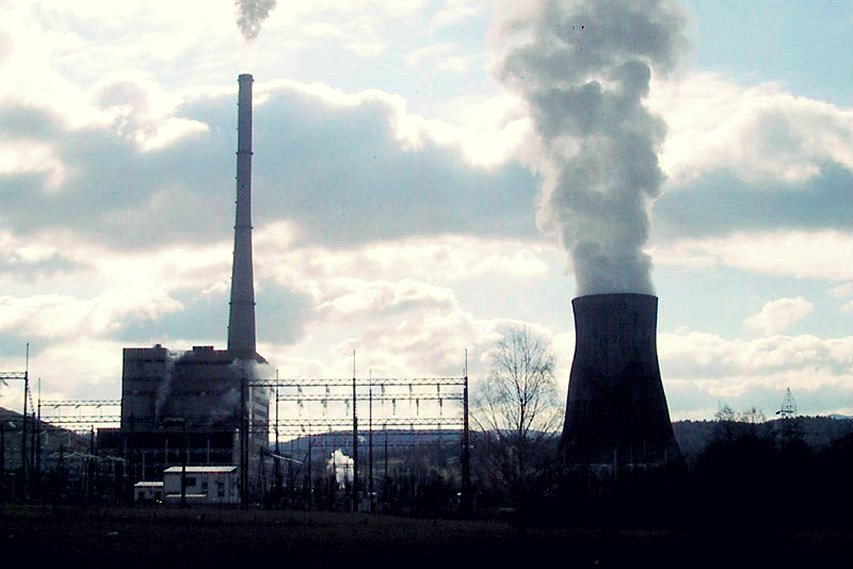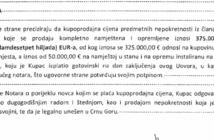MANS warns that the new Thermal Power Plant in Pljevlja is not viable without state aid
 Montenegrin Government conceived controversial construction of the project of the Second Block of the Thermal Power Plant in Pljevlja on manipulative data on the actual cost of coal required for the operation of new Power Plant, on what basis and unrealistically projected production of electricity cost. The Second Block, according to the current prices of electricity, would produce millions in losses, and it is likely scenario that the Government would through the allocation of state subsidies maintain this project, according to the analysis of the Research Center of MANS.
Montenegrin Government conceived controversial construction of the project of the Second Block of the Thermal Power Plant in Pljevlja on manipulative data on the actual cost of coal required for the operation of new Power Plant, on what basis and unrealistically projected production of electricity cost. The Second Block, according to the current prices of electricity, would produce millions in losses, and it is likely scenario that the Government would through the allocation of state subsidies maintain this project, according to the analysis of the Research Center of MANS.
The analysis was made based on official government data presented in the Draft Detailed Spatial Plan (DPP) for a Thermal Power Plant in Pljevlja, for which a public hearing was held in May last year, as well as the data that MANS collected using Law on Free Access to Information.
According to the draft of the DPP, the price of coal for the Second Block is determined in the amount of 20.08 euros per tonne of coal quality of 9,560 kcal / kg. However, the current purchase agreement between the National Energy Company (EPCG) and Coal Mine Pljevlja companies indicates that the company from Pljevlja, for the operation of the excisting Thermal Power Plant, coal of lower quality (9,211 kJ / kg) sales to the EPCG at a much higher price, ie at 25.65 euros per tonne.
This means that the actual price of coal is significantly estimated and that the guaranteed quality of 9,560 kcal / kg was 26.62 euros per tonne, so it is clear that the Government substantially reduced the total annual cost of coal, which is a key element in the cost price of electricity from the Thermal Power Plant. Therefore it is undervalued and projected production cost of electricity of 42 euros per megawatt and it is realistically much higher.
However, even if the government’s projections of production cost of electricity from the Second Block of 42 euros per megawatt applied at the current price of 37.57 euros per megawatt, which at regulated tariffs pay domestic consumers, it is clear that the new Thermal Power Plants would produce losses in business. Thus, at current prices, based on supply of Czech company Skoda Praha (block of 254 MW and production of 1,600 GWh), annual loss would be seven million euros.
In this regard, it is important to note that the current price of electricity on the European markets are even lower and amounts to an average of about 30 euros per megawatt. It is estimated that the trend of low electricity prices in the European markets will be maintained and in the upcoming years.
On the other hand, official data on the financial operations of the Pljevlja coal mine indicate that the company is in huge debts and from its own resources can not finance the opening of mines for the operation of the Second Block. By the end of operation of the First and the new Second Blocks, the new Pljevlja-based company needs to invest 230 million euros for the opening of new mines and re-cultivation of land, which is an obligation defined by the Mining Act.
So, all these data suggest that the persistence of the Government at the project of the Second Block could be an introduction to a new allocation of state aid, and in that regard are indicative recent amendments to the Energy Law, according to which the exploitation of coal for the production of electricity is defined as an activity of public interest.
Namely, when one bears in mind that the Law on State Aid Control enables help (subsidies, fiscal exemptions, debt write-offs, etc.) for the activities of public interest it is obvious that in this way is opened the way for the award of a form of state aid for the project of the construction the Second Block.
From the Government has recently announced that the project of the Second Block will be implemented by formation of a separate company in which the state will have 51 percent and 49 percent will have the EPCG. State energy company would purchas electricity from this new company at the cost principle in order a new company to be sustainable at all, which could be a model for the allocation of state aid.
Research Center of MANS in previous days announced that the investment costs for the project of the Second Block would exceed one billion euros, while the costs of health and environmental protection during the 40 years of operation of the new Power Plants are estimated at 2.5 billion euros, so the total cost price of the new “dirty” energy sources in the country could reach a whopping sum of 3.5 billion euros.
This text is made by the support of the European Union within the project “Zero tolerance to corruption”. For the contents of this article is solely responsibile the Network for Affirmation of Non-Governmental Sector – MANS, and views presented in this article can not be, in any case, considered as views of the European Union.
Croats gave up building Plomin C?
Croatian officials have recently hinted the closure of the announced project for the construction of the Thermal Power Plant Plomin C, based on coal imports. Problematic project Plomin C for months has been the subject of controversy in the Croatian public and the target of sharp criticism of the local public, primarily non-governmental organizations, who asked for its suspension.
From the Croatian Government has recently openly admitted what the non-governmental organizations argued for months – that the construction of the Thermal Power Plant Plomin C is economically and ecologically non-profitable investment. Recognition came only after Brussels and the European Union announced that it will launch an investigation into the state aid that the Croatian Government intends to provide for the project.
The Government in Zagreb earlier as the best partner for the construction of Plomin C chose the Japanese company Marubeni, but the project has not received the green light from the European Union. In fact, it was controversial clause under which the Croatia National Energy Company would purchas half the electricity at a fixed price from Marubenija, which in Brussels consider as the support that distorts market competition.
Slovenian Sostanj 6 annually loses tens of millions of euros
Another example of the construction of the Power Plant in the neighborhood suggests caution in
planning of that kind of energy facilities. It is a Thermal Power Plant Sostanj 6 in Slovenia, which was built to replace five old buildings that are located in the same complex.
The project originally expected to cost 602 million euros, to provide 3.5 thousands of new jobs and create profits. However, the constructed block reached price of a whopping 1.4 billion euros, employs about 450 workers, and it is expected that in the near future part of them to be paid off, and it is estimated that under the current prices of electricity annually produce losses of tens of millions of euros.
According to the Slovenian non-governmental organization Focus, police investigation revealed that one of the main reasons for the huge cost of building the Power Plant was corruption, actually more precisely unjustified profit of 285 million euros for the main contractor – French company Alstom. Ten people were suspected of fraud in connection with the illegal gains of the French company.
At the same time as another reason is mentioned the alleged poor quality economic analysis which is based on the high cost of electricity, which has fallen meantime, so it is estimated that Sostanj 6 annually produces losses of tens of millions of euros.
By: Ines Mrdovic (MANS)



